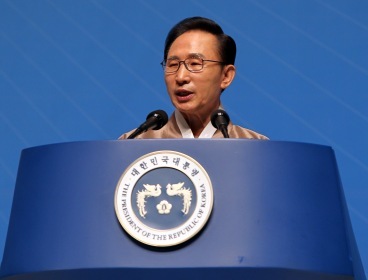“Japan has a responsibility to teach its young generation the truth about what happened in the past,” Lee said during his annual national address marking Liberation Day.
“By doing so, we can then allow young people in Korea and Japan to forge ahead into the new era with a correct recognition and understanding of history. This kind of cooperation will greatly contribute to the peace and prosperity of the world as well as Northeast Asia.”
Japan has provoked South Korea by claiming the South Korean island of Dokdo as its own in its official papers and refusing to address several post-war issues such as compensation for the “comfort women” who were forced by the Japanese military into sexual slavery during World War II.
Noting that the Seoul government has strived to maintain mature relations with Japan, Lee said, Japan’s past wrongdoing will not be forgotten.
“For the sake of the future relationship, Korea will not be bound by the unfortunate past. But at the same time, the Korean people can never forget the history of the recent past altogether,” he said.
Lee did not specifically mention Dokdo in Monday’s national address as there was no need, senior presidential secretary for public relations Kim Du-woo said, referring to the president’s remark earlier this year that Dokdo would be South Korean territory “even if the whole world was turned upside down twice.”
Also during Monday’s speech, Lee set 2013 as the target year for his government to achieve a balanced budget, reflecting a growing pressure for fiscal soundness as fiscal crises in the U.S. and Europe raised economic uncertainties across the globe. So far, the Seoul government has officially targeted “between 2013 and 2014” for balancing the budget.
“I will do my utmost to realize a balanced budget by 2013, if possible, when my term in office comes to an end,” Lee said.
The president presented “ecosystemic” development as Korea’s new path as the 2008 U.S. financial crisis and the ongoing debt crises clearly showed that neither a market economy based on competition nor a welfare state model that runs on constant government spending were perfect.
“What is now being demanded is a new model of the market economy that evolves from greedy management to ethical management; from the freedom of capital to the responsibility of capital; and from the vicious circle of the rich getting richer and the poor getting poorer to mutual prosperity,” Lee said.
“Accordingly, politics should evolve as well. There is also an expanding consensus on the necessity for change from politics centering around one nation to global democracy and from the ‘politics of ideology’ to the ‘politics of life.’”
Lee championed the role of the G20 in improving global governance and seeking sustainable growth as well as “all-embracing” growth that will help reduce disparities.
“That is why I put forth a vision of green growth, a pro-working class policy based on centrist pragmatism and a belief in a fair society,” he said.
The president explained that his vision for “fair society” originated from his government’s policy focus on helping low-income families and building up the middle class in the aftermath of the 2008 financial crisis.
“Last year, the government put forth ‘fair society’ as a vision for running state affairs to give hardworking people hope by curbing corruptive practices and the misuse of privileges,” he said.
“The ultimate goal of the new vision is to sever the vicious cycle of the economic gap leading to a social gap, which often ends up in the disparity of opportunities.”
While acknowledging the need to increase the welfare budget as Korea is becoming a “super-aged society,” the president warned against populist calls for increased welfare ahead of the parliamentary and presidential elections next year.
“In some countries, competitive welfare populism by lawmakers brought about national bankruptcy. We have to avoid repeating the same mistakes,” Lee said.
“If the state budget is depleted, it would be impossible to continue implementing welfare policies. In addition, we should not make the error of giving financial aid to those who are well off, thus preventing such assistance flowing into the hands of those in desperate need.”
Lee is set to cast an absentee ballot for an Aug. 24 plebiscite on whether Seoul City should offer free lunches to all students regardless of their parents’ income levels.
Korea’s state welfare budget this year amounted to 86 trillion won, or approximately 30 percent of the total budget, the highest amount ever.
“We have to remain vigilant so that policies formulated for present convenience do not become an unmanageable burden for future generations,” he added.
Lee also said Monday that South Korea’s reunification with North Korea was the greatest issue in modern Korean history.
“Reunification would be the perfection of national liberation,” he said.
“Over the past 60 years, the South and North have lived in conflict. Now is the time to overcome it and open up an age of peace and cooperation.”
The president vowed to continue humanitarian assistance for children in the North as well as support to help the impoverished country recover from natural disasters.
Lee also called for the parliament’s prompt ratification of South Korea’s free trade agreement with the United States, noting that a further delay could make Korea lag behind competing nations.
“There has been a report that the Korea-U.S. FTA will bolster the country’s GDP by 5.7 percent and create 350,000 new jobs. Another important benefit of the Korea-U.S. FTA will be the strengthening of the bilateral alliance,” he said.
“If we lose more time, we may lag behind competing nations. The government has prepared remedial measures to address some relevant issues. The treaty must be ratified for the future of the Republic.”
By Kim So-hyun (
sophie@heraldcorp.com)







![[Today’s K-pop] Blackpink’s Jennie, Lisa invited to Coachella as solo acts](http://res.heraldm.com/phpwas/restmb_idxmake.php?idx=644&simg=/content/image/2024/11/21/20241121050099_0.jpg)
